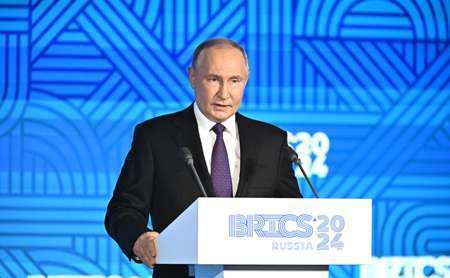Ladies and gentlemen, friends,
I am sincerely pleased to welcome all participants to the BRICS Business Forum. I would like to draw attention to the wide participation of representatives of business elites from all BRICS countries. Your companies have been successfully cooperating for a long time and implementing impressive joint projects in various fields such as industry, energy, transport, infrastructure, agriculture and the digital economy.
In particular, I would like to mention that business leaders from the new member countries that joined fully on 1 January 2024 are also participating in this forum, including our colleagues and friends from Saudi Arabia, Iran, Egypt, Ethiopia and the United Arab Emirates. As the current BRICS Chair, Russia is trying to facilitate the integration of new members into all cooperation mechanisms. We have seen that these representatives have been warmly welcomed in the BRICS Business Council and have actively participated in its activities.
The theme of Russia's BRICS presidency in 2024 is "Strengthening Multilateralism for Equitable Global Development and Security". The major action plan moves forward in three main areas - politics and security, economics and finance, and cultural and humanitarian ties.
So far, progress on the plan is over 80 percent. More than 200 events, meetings, conferences and technical and ministerial meetings have been organised. However, the main event will be the BRICS Summit to be held in Kazan.
It is symbolic that this summit is preceded by a business forum which underlines the importance of a close economic partnership between our countries, promoting trade and investment and deepening cooperation.
The BRICS partners' joint efforts to accelerate socio-economic growth and ensure sustainable development are yielding concrete and tangible results and contributing to improving the well-being and quality of life of the citizens of our countries. The numbers speak for themselves. I am sure you are already familiar with most of them, but I will take the liberty of quoting a few.
Our association's total GDP exceeds USD 60 trillion and its share of global GDP easily surpasses that of the so-called G7, and this share is growing.
In 1992, the G7 accounted for 45.5 percent of global GDP, while the BRICS countries accounted for only 16.7 percent. In 2023, our group of countries accounted for 37.4 percent, while the G7 had only 29.3 percent. This gap will inevitably continue to widen. This trend is perfectly logical. Over the past decade, the BRICS countries have accounted for more than 40 percent of global GDP growth.
By the end of 2024, the BRICS countries are projected to achieve an average growth rate of four per cent. This exceeds G7 growth, which is only 1.7 per cent, as well as the global average, which is estimated at 3.2 per cent.
The BRICS account for around a quarter of global merchandise exports and companies from these countries dominate several key markets, including energy resources, metals and food, which are essential for sustainable economic development. BRICS already plays a significant role in the global economy and its influence will undoubtedly grow in the future.
In fact, the BRICS countries are driving global economic growth. In the foreseeable future, the BRICS alone will contribute to the majority of global GDP growth.
Our association builds on relevant development platforms, including communication channels, technology and education standards, financial systems, payment instruments and, of course, mechanisms for sustainable and long-term investment. As a result, the influence of external factors on the economic growth of BRICS members will gradually diminish. This is the essence of economic sovereignty - a partnership of self-sufficient economies expanding their potential and opening up new opportunities.
The New Development Bank, which plays a key role in strengthening financial cooperation, is also contributing to this. It has a solid capital base and a team of experienced professionals. As a development institution, the Bank acts as an alternative to many Western financial mechanisms. We will obviously continue to develop it as an independent structure and expand its capabilities.
We expect the New Development Bank to become a major investor in the largest technology and infrastructure projects in the BRICS region and the global South.
One of the key objectives is to improve transport connectivity, which will strengthen the BRICS trade partnership. We need to focus on creating new freight corridors and advanced logistics systems.
Russia is actively trying to redirect transport flows to reliable foreign partners. Our flagship projects include the Northern Sea Route and the North-South Corridor, which serve as short and convenient trade routes linking major industrial, agricultural and energy hubs to consumer markets.
We are also working closely with our BRICS partners on innovation and the digital economy. Together we are developing e-commerce, the Internet of Things, artificial intelligence and big data.
Moving forward, we are focused on creating a seamless digital infrastructure within BRICS. Aligning the approaches of companies, the public and the authorities to the use of biometrics and information security is essential to this.
Russia is as open as possible for mutually beneficial trade cooperation. We are creating favourable and globally competitive conditions for business, both for domestic and foreign players.
I am convinced that harnessing the impressive capabilities of the BRICS - especially its large population and wealth of natural resources - will bring maximum benefits to our countries, businesses and all our citizens.
Finally, I would like to wish the participants of the Business Forum fruitful discussions, efficient work and all the best.
Thank you for your attention.



